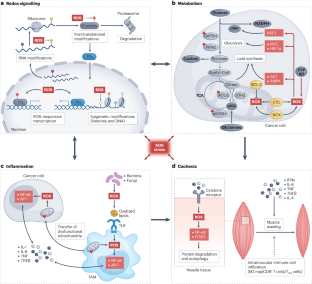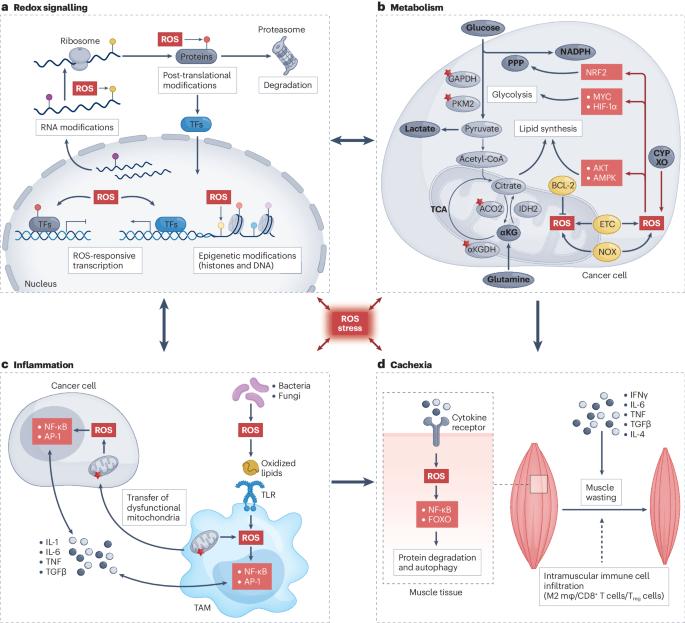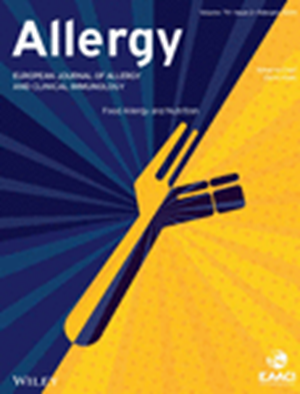针对癌症中的 ROS:原理与策略。
IF 12.6
1区 医学
Q1 ALLERGY
引用次数: 0
摘要
生物系统中的活性氧(ROS)是一种瞬时但不可或缺的分子,由一系列复杂的、微妙平衡的分子机制生成和消除。氧化还原平衡的破坏与多种人类疾病有关,尤其是癌症,其中 ROS 水平的增加被认为在肿瘤的发展和恶化中起着重要作用。因此,通过靶向 ROS 及其调控机制来调节细胞氧化还原状态被认为是一种很有前景的癌症治疗策略。最近,这一领域取得了重大进展,包括发现了影响肿瘤细胞代谢和肿瘤微环境中免疫细胞的新型氧化还原信号通路,以及引人入胜的 ROS 对生物分子相分离的调控。在探索癌症干细胞的氧化还原调控、ROS 在决定细胞命运中的作用以及针对 ROS 的新型抗癌药物方面也取得了进展。本综述将讨论这些研究进展及其对癌症治疗和药物发现的影响,以及新出现的概念、悖论和未来展望。本文章由计算机程序翻译,如有差异,请以英文原文为准。


Targeting ROS in cancer: rationale and strategies
Reactive oxygen species (ROS) in biological systems are transient but essential molecules that are generated and eliminated by a complex set of delicately balanced molecular machineries. Disruption of redox homeostasis has been associated with various human diseases, especially cancer, in which increased ROS levels are thought to have a major role in tumour development and progression. As such, modulation of cellular redox status by targeting ROS and their regulatory machineries is considered a promising therapeutic strategy for cancer treatment. Recently, there has been major progress in this field, including the discovery of novel redox signalling pathways that affect the metabolism of tumour cells as well as immune cells in the tumour microenvironment, and the intriguing ROS regulation of biomolecular phase separation. Progress has also been made in exploring redox regulation in cancer stem cells, the role of ROS in determining cell fate and new anticancer agents that target ROS. This Review discusses these research developments and their implications for cancer therapy and drug discovery, as well as emerging concepts, paradoxes and future perspectives. Reactive oxygen species are essential molecules that are generated and eliminated through complex balanced mechanisms. Increased reactive oxygen species levels have a role in tumour development, and targeting reactive oxygen species and their regulatory machineries is a promising therapeutic strategy. This Review discusses recent research developments in the field, their implications for cancer drug discovery, as well as emerging concepts and future perspectives.
求助全文
通过发布文献求助,成功后即可免费获取论文全文。
去求助
来源期刊

Allergy
医学-过敏
CiteScore
26.10
自引率
9.70%
发文量
393
审稿时长
2 months
期刊介绍:
Allergy is an international and multidisciplinary journal that aims to advance, impact, and communicate all aspects of the discipline of Allergy/Immunology. It publishes original articles, reviews, position papers, guidelines, editorials, news and commentaries, letters to the editors, and correspondences. The journal accepts articles based on their scientific merit and quality.
Allergy seeks to maintain contact between basic and clinical Allergy/Immunology and encourages contributions from contributors and readers from all countries. In addition to its publication, Allergy also provides abstracting and indexing information. Some of the databases that include Allergy abstracts are Abstracts on Hygiene & Communicable Disease, Academic Search Alumni Edition, AgBiotech News & Information, AGRICOLA Database, Biological Abstracts, PubMed Dietary Supplement Subset, and Global Health, among others.
 求助内容:
求助内容: 应助结果提醒方式:
应助结果提醒方式:


